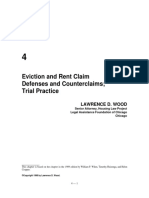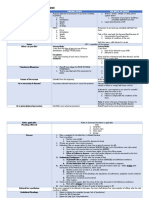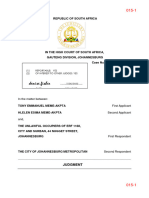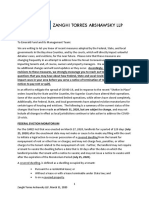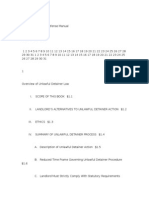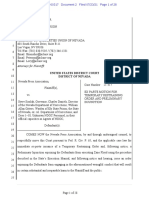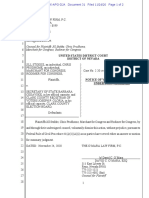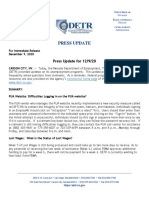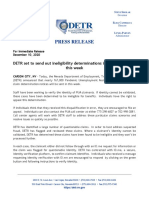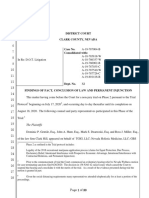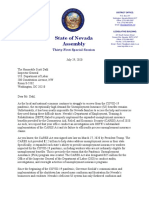0 ratings0% found this document useful (0 votes) 372 views12 pagesNevada Eviction Mediation Program Final Rules
Issued by the Nevada Supreme Court.
Copyright
© © All Rights Reserved
We take content rights seriously. If you suspect this is your content,
claim it here.
Available Formats
Download as PDF or read online on Scribd
‘Surnene Count
Be
IN THE SUPREME COURT OF THE STATE OF NEVADA
IN THE MATTER OF RESIDENTIAL avgtose7 PILE
SUMMARY EVICTION ACTIONS AND
NOTICES DURING COVID.19. OCT 08 2
ORDER ADOPTING THE TEMPORARY RESIDENTIAL?
SUMMARY EVICTION MEDIATION RULES
WHEREAS, on August 31, 2020, Chief Justice Kristina
Pickering and Justice James Hardesty filed a petition requesting the
Nevada Supreme Court to adopt rules relating to mediation of summary
residential evictions and to amend the Nevada Justice Court Rules of Civil
Procedure respecting summary eviction notices.
WHEREAS, this court solicited public comment on the petition
and a public hearing was held in this matter on September 22, 2020, and
thereafter invited additional public comment; and
WHEREAS, the adoption of the Temporary Residential
Summary Eviction Mediation Rules is appropriate; accordingly,
IT IS HEREBY ORDERED that the Temporary Residential
Summary Eviction Mediation Rules shall be adopted and shall read as set
forth in Exhibit A.
IT IS FURTHER ORDERED that the adoption of the
Temporary Residential Summary Eviction Mediation Rules shall be
effective on October 15, 2020. On August 31, 2020, Governor Sisolak
entered Declaration of Emergency Directive 31 ordering that the Supreme
Court may exercise its inherent authority as a separate branch of
government to waive the provisions of NRS 2.120 requiring 60 days between
20-3bebw�‘nee Count
Neon
00 Be
the notice of entry of new rules and its implementation for the purpose of
adopting new rules to implement SBI. The clerk of this court shall cause a
notice of entry of this order to be published in the official publication of the
State Bar of Nevada. Publication of this order shall be accomplished by the
clerk disseminating copies of this order to all subscribers of the advance
sheets of the Nevada Reports and all persons and agencies listed in NRS
2.345, and to the executive director of the State Bar of Nevada. The
certificate of the clerk of this court as to the accomplishment of the above-
described publication of notice of entry and dissemination of this order shall
be conclusive evidence of the adoption and publication of the foregoing rule
adoption.!
Dated this &™ day of October, 2020.
Prado
rang ttl
Ab , oe
Gibbons Hardesty
OS amnnn AV ZED vai
Stiglich
Cadish Silver
Parraguirre
‘Nothing in these rules is intended to terminate or prevent any
voluntary mediation program that has been organized to resolve landlord
and tenant disputes prior to any court involvement.�‘urn Court
ey
m6 >
All District Court Judges
All Justices of the Peace
Hon. Diana L. Sullivan, Justice of the Peace, Las Vegas Township and
President, Nevada Judges of Limited Jurisdiction
Barbara Buckley, Executive Director, Legal Aid Center of Southern
Nevada
dim Berchtold, Directing Attorney, Consumer Rights Project
Eric Dobberstein, President, State Bar of Nevada
Kimberly Farmer, Executive Director, State Bar of Nevada
Clark County Bar Association
Washoe County Bar Association
First Judicial District Bar Association
Elko County Bar Association
Douglas County Bar Association
Administrative Office of the Courts�EXHIBIT A
ADOPTION OF TEMPORARY RESIDENTIAL SUMMARY
EVICTION MEDIATION RULES
Rule 1. Applicability. This rule applies to summary eviction actions
filed pursuant to NRS 40.253. The justice court may in its discretion refer
summary eviction actions filed pursuant to NRS 40.254 to mediation under
this rule.
Rule 2. Definitions.
(@) “Mediation” in this context means a process in which a neutral third
party facilitates a confidential discussion between the landlord and tenant to
explore alternatives to court-ordered summary eviction. It is an informal and
nonadversarial process with the objective of helping the landlord and tenant
determine, together, whether they can reach a mutually acceptable and
voluntary agreement to resolve their dispute. ‘'he role of the mediator includes,
but is not limited to, helping the parties to identify issues and resources and
explore settlement options, as well as fostering direct communication and
collaborative problem solving.
(b) “Mediation Administrator” or “Administrator” means the person or
entity designated by the supreme court to be responsible for administering the
summary eviction mediation program throughout the state.
Rule 3. Information to be included on the justice court
website. The justice court must post in its clerk’s office and provide on its
website, if one is maintained, information in both English and Spanish
concerning the availability of:�(a) An existing mediation program;
(b) Known government-sponsored rental assistance programs;
(c) An electronic option for filing the tenant's affidavit, if available; and
(d) Civil legal aid programs, court self-help centers, or similar programs
in the jurisdiction that may be able to assist the tenant with completing and
filing a tenant's affidavit.
Rule 4. Information to be included in the landlord notice. In
addition to the requirements of JCRCP 101 and NRS 40.253(3), a notice served
pursuant to NRS 40.253(1) or (2) must:
{a) Advise the tenant(s) of the availability of:
(2) An existing mediation program;
(2) Government-sponsored rental assistance programs; and
(3) An electronic option for filing a tenant's affidavit.
(b) A landlord may comply with the notice requirements of paragraph
(e)(1) by including in the notice in bold type the following: “Tenants are advised
that the [____] Justice Court has information on its website concerning the
availability of mediation, government-sponsored rental assistance, and
electronic filing for the tenant affidavit, among other matters. A tenant may
access this information at [insert link here].”
(© In jurisdictions where the justice court does not have a website, a
landlord may comply with the notice requirements of paragraph (e)(1) by
including in the notice in bold type the following: “Tenants are advised that
information concerning the availability of mediation and government-
sponsored rental assistance may be accessed at [insert link here to
administrator's information page, then require admin. to post this info.].”�(d) In addition to the requirements of NRS 40.254(1)(c), a notice served
pursuant to NRS 40.254(1) must advise the tenant of the availability of any
electronic option for the filing of the tenant’s affidavit.
Rule 5. Procedure for requesting mediation.
(a) A tenant may request mediation of a summary eviction action by
stating that request in the affidavit filed by the tenant in the matter pursuant
to NRS 40.253(3). Such request must include:
(1) A preferred method of mediation, ie., whether in person, by
telephone, or by videoconferencing:
(2) The name of the tenant(s) who will be participating in the
mediation;
(8) Accurate contact information for each participating tenant,
including address, telephone number, and email address for receiving notices
from the court and mediator;
(4) Whether an interpreter is required and the language needed;
(5) A statement indicating whether the tenant has previously
applied for rental assistance and, if so, identifying the entity or entities to
which application was made, and whether such application was approved,
denied, or pending; and
(6) A statement as to whether the tenant has previously entered
into a repayment plan with the landlord for rental arrearages.
(b) A landlord may request mediation of a summary eviction action by
stating that request in the complaint for eviction filed by the landlord in the
matter. Regardless of whether the landlord requests mediation, the complaint
for eviction must include:�(1) A preferred method of mediation, i-e., whether in person, by
telephone, or by videoconferencing:
(2) The name of the individual who has authority to settle the case
and will be participating in the mediation; and
(3) Accurate contact information for the individual with authority
to settle the case, including address, telephone number, and email address for
receiving notices from the court and mediator.
Rule 6. Court order setting summary eviction hearing when
mediation requested. If the landlord or tenant requests mediation of the
summary eviction action, immediately upon the filing of the complaint by the
landlord the court will serve a written order to the landlord, tenant, and
Administrator that:
(a) Sets the date, time, location, and method of the summary eviction
hearing, which date shall be no sooner than 30 days after the filing of the
complaint;
(b) Provides the contact information of the Administrator, landlord, and
tenant and requires the landlord and tenant to contact the Administrator
immediately if the listed contact information has changed or another method
of contact is preferred;
(©) States that the Administrator will assign a mediator who will notify
the parties of the date, time, location, and method of the mediation;
(a) Directs the landlord and tenant to register with the online portal
maintained by the Administrator, if one is established;
(e) Notifies the landlord that failure to participate in mediation may
result in dismissal of the summary eviction action; and�(® Notifies the tenant that failure to participate in mediation will result
in the summary eviction hearing proceeding as scheduled.
Rule 7. Assignment of mediator and scheduling of
mediation. No later than 2 working days after receipt of the order from the
court, the Administrator shall randomly select and assign a mediator to
preside over the mediation and shall notify the selected mediator of the
assignment. The Administrator may direct a mediator to group mediations
relating to a single landlord.
(a) The Administrator shall maintain a list of mediators available to hear
eviction mediations. The list shall include mediators appointed by the Nevada
Supreme Court to serve as mediators.
(>) Mediators must meet the following qualifications:
(1) Be an experienced mediator who has participated in a training
program consisting of at least 40 hours of classroom and role playing and who
has conducted 10 mediations as a co-mediator or sole mediator; and
(2) Participate in a training program of at least 2 hours consisting
of education in evictions, landlord-tenant law, and such other topics as
determined necessary by the Administrator or the court.
(©) No later than 3 working days after notification of selection by the
Administrator, the assigned mediator shall send notice to the landlord, tenant,
Administrator, and interpreter, if one has been requested, of the date, time,
location, and method of mediation by email, regular mail, or the online portal
maintained by the Administrator, if one is established. The mediator shall
consider the tenant’s and the landlord’s stated preferences with respect to the
form the mediation takes but the ultimate decision is up to the mediator.�(1) The mediator shall set the mediation for a date not later than
8 judicial days prior to the date of the summary eviction hearing set by the
court.
(2) The mediator may at any time prior to the mediation continue
the date of the mediation upon the request of the landlord or tenant for good
cause to a date not later than 3 judicial days prior to the date of the summary
eviction hearing.
(8) The assigned mediator is responsible for:
(A) Initiating the call to the parties at the phone numbers
provided in the pleadings, when mediation is ordered by telephone; or
(B) Selecting the video-teleconferencing platform, paying for
any video-teleconferencing fees, and sending the teleconference invitation to
the parties at the email addresses provided in the pleadings, when mediation
is ordered by video-teleconferencing; or
(C) Providing an office or other comparable space to conduct
the mediation.
(d) At the mediation, the mediator must discuss with the parties and
counsel, if any, the facts and issues involved, and assist the parties in
identifying and resolving issues and exploring rent relief and other funds
available to resolve the dispute and settlement alternatives. The mediator may
also request that representatives of existing programs for rental or other
assistance or representatives from Nevada's DETR participate in the
mediation. Any such representative would be subject to the confidentiality
provisions of these Rules
(e) The mediation will continue until a settlement is reached or the
parties have reached an impasse. If settlement is reached, the mediator will
assist the parties in reducing their settlement agreement to writing, which�writing shall be signed by both landlord and tenant. Electronic signatures are
acceptable.
(1) Settlement agreements resulting in a payment arrangement
between the landlord and tenant must specify the terms of the payment
arrangement to include:
(A) When, where, and how payments are to be made;
(B) The amount of payments; and
(C) The acceptable method of such payments, ie., cash,
check, or money order.
(2) Settlement agreements resulting in a tenant's surrender of the
property must specify the date and time such surrender is to be complete.
(3) All settlement agreements must inform the parties that any
allegations of noncompliance of the opposing party must be addressed by the
court by way of a motion to enforce the settlement agreement. Such motion
must be accompanied by an affidavit or declaration under the penalty of
perjury setting forth the details of the noncompliance. Such motions must be
served on the opposing party.
(f) At least 2 judicial days prior to the scheduled court date, the mediator
must file either:
(1) A copy of the written settlement agreement with the court; or
(2) A document identifying that no settlement was reached and
whether either party failed to appear.
(g) At or before the scheduled summary eviction hearing, the court must
review any written settlement agreement or report of the mediator indicating
whether a party failed to appear for mediation.
(2) If the landlord fails to appear at mediation, the court may
dismiss the complaint.�(2) If the tenant fails to appear at mediation, the court must
proceed with the hearing on the summary eviction.
(8) If the parties entered into a written settlement agreement, the
court must review the terms of the agreement and determine how the case
should proceed.
(h) Motions to enforce settlement agreements arising through mediation
must be heard within 7-10 judicial days. After hearing, should the court issue
an eviction order, the tenant is not eligible for a further stay of execution of the
order.
Rule 8. Confidentiality. Statements and communications made
during the mediation process, including pre- or _post-mediation
communications are confidential and, under NRS 48.105 and NRS 48.109, not
subject to discovery or admissible in a proceeding unless all mediation
participants agree in writing or a statute or court rule requires otherwise.
Rule 9. Costs and payments. Mediation shall be conducted at no cost
to the landlord or tenant. Mediators and interpreters shall be paid a fee
established by the Access to Justice Commission and shall prepare an invoice
using the prescribed form outlining their services and submit such invoice to
the Administrative Office of the Courts for payment pursuant to the form
instructions.
Rule 10. Statistical information regarding _ mediation.
Notwithstanding the requirements of NRS 40.2545, the court shall gather and
maintain statistical information sufficient to determine the number of
summary eviction actions in which mediation was requested and whether�requested by landlord or tenant, the number of actions submitted to mediation,
the number of actions in which a settlement was reached, the number of
actions in which no settlement was reached, and the number of evictions
ultimately granted where no settlement. was reached.
Rule 11. Sunset of the Residential Mediation Rule. This rule is
created for the purpose of allowing courts to handle a potential increased
caseload due to financial hardship created by the COVID-19 pandemic, to the
lifting of state and/or national moratoria on certain eviction actions, and to
assist and encourage landlords and tenants to resolve summary eviction
actions through available rental assistance programs. This rule is effective on
October 15, 2020, and unless extended by further order of the supreme court
upon a showing of good cause, will remain in effect until the earlier of:
(a) The exhaustion of CARES Act funds or other funding to pay for
mediators and the administration of the program; or
(b) May 31, 2021.












